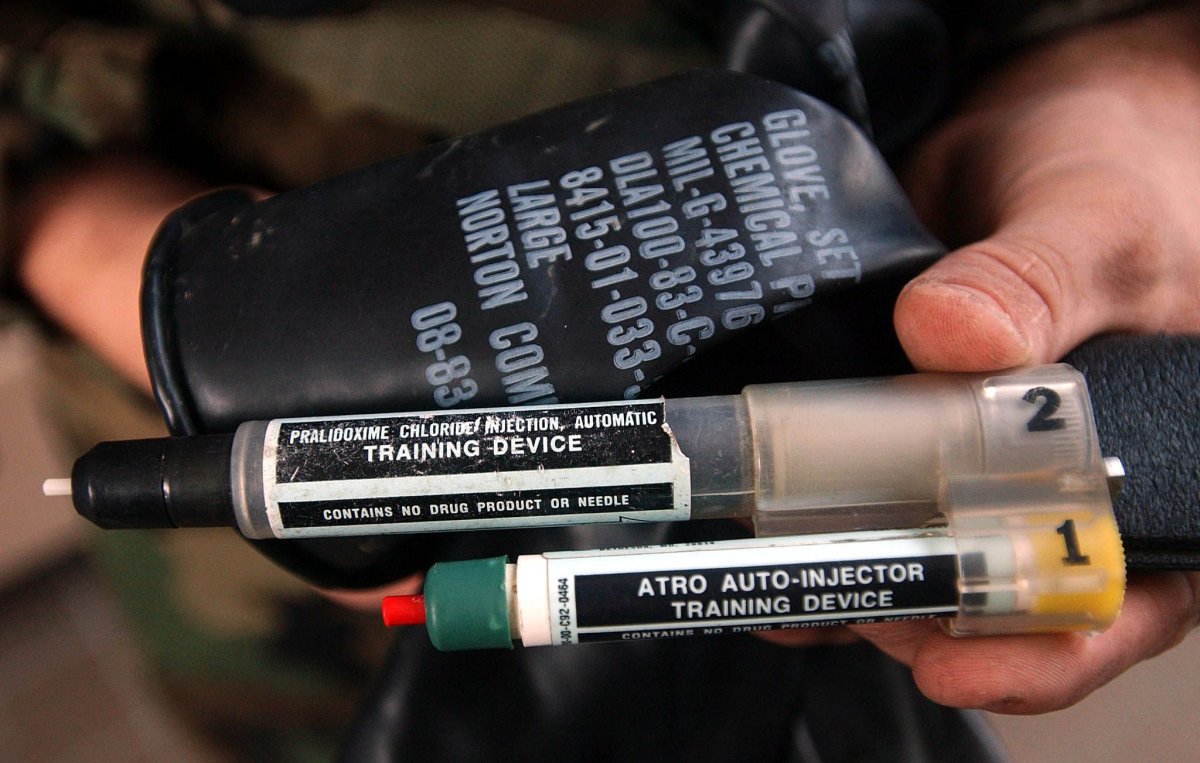
When Kim Jong-nam, half-brother of North Korean dictator Kim Jong-un, was assassinated with a nerve gas in Malaysia earlier this year, he was carrying a dozen bottles of the antidote, Atropine, in his backpack. But what is Atropine, and why, when he'd so clearly prepared to do so, wasn't Kim Jong-nam able to use it?
On November 30, the Malaysian High Court heard testimony that Kim Jong-nam was carrying 12 bottles of Atropine at the time of his death, according to reports, including the Washington Post. Kim Jong-nam, who traveled under the alias Kim Chol, died after assassins wiped a cloth treated with VX nerve gas across his face at Kuala Lumpur International Airport on February 13.
Atropine is a medication that, when injected, can treat organophosphate poisoning, which is caused by nerve agents and insecticides. Nerve gases are chemical weapons, the kind responsible for, among others, the 2013 attack in Syria that killed more than 1,400 civilians. As Time reported, North Korea is currently in possession of around 2,500 to 5,000 tons of chemical weapons, including VX.

When the body is attacked with a nerve agent, it's forced to increase secretion—by a lot.
"Salivation, tears, urinating on yourself, sweating, diarrhea, throwing up...all of that's going to happen," Dr. Rahul Khare, founder and emergency physician at Innovative Express Care, told Newsweek. "Atropine does the opposite of that; it dries everything up."
But dehydration isn't what kills people who suffer organophosphate poisoning. The actual cause of death after someone's exposed to a nerve agent like VX, Khare said, is that they rapidly accumulate so much secretion in their lungs that they can't breathe.
According to a explainer by the Council on Foreign Relations, VX is the deadliest nerve agent ever created, and the only new one of consequence since World War II.
"Known by its U.S. Army code name, it is a clear, colorless liquid with the consistency of motor oil," read the CFR statement. "A fraction of a drop of VX, absorbed through the skin, can fatally disrupt the nervous system. Although a cocktail of drugs can serve as an antidote, VX acts so quickly that victims would have to be injected with the antidote almost immediately to have a chance at survival."
"Almost immediately," according to Khare, means more than a few seconds, but not much more. If Kim Jong-nam had been attacked with a relatively low amount of VX, he might have had 20 to 30 minutes to administer his supply of Atropine. The fact that he wasn't able to do so therefore suggests that he was attacked with a heavy dose.
"If it's a high dose, lethal, you have probably a minute to two minutes to understand that you've been poisoned and then get the Atropine and stab yourself with it," Khare said. "You definitely want to stab yourself with it, and then give yourself more and more, depending on how much nerve gas you were poisoned with."
That window is as brief as it is not because Atropine wouldn't be effective at drying the body out after that point, but because once poisoned, the victim's lungs almost immediately become too full of secretions to breathe—you can only go a few minutes without air.
The way Atropine works also gives us an idea of why Kim Jong-nam was carrying so much of it. The more severe the poisoning, the more Atropine you need, and it's very hard to administer too much antidote. Khare said the standard practice is to inject 1 milligram, wait about three minutes, then another milligram, and so forth.
"You're really just limited by whatever amount that you have," Khare said. "Mostly the problem is there's not enough in the hospital. But if there is, we've heard of people using 30, 40 milligrams."

After the 2013 Syria attack, Smithsonian called Atropine the "simplest treatment" for nerve agents, and explained that humans have been using Atropine for a variety of purposes for centuries. Ancient Egyptian women used it for dilating their pupils, while ancient Greeks used it as an anesthetic; Atropine is still used in both those contexts today.
"But the one he'd need, for when you're poisoned, is an injectable that can only really be gotten from a crash cart at a hospital," Khare said. "If someone prescribed it to you at your local Walgreens, you wouldn't be able to get it. I've been practicing 15 years and never prescribed it."
Though 1 milligram doses are the standard, there's no way to be certain that the 12 bottles Kim Jong-nam was carrying each represented one standard dose.
"Either way," Khare said, "he was preparing for a lot."
Uncommon Knowledge
Newsweek is committed to challenging conventional wisdom and finding connections in the search for common ground.
Newsweek is committed to challenging conventional wisdom and finding connections in the search for common ground.
About the writer
Kastalia Medrano is a Manhattan-based journalist whose writing has appeared at outlets like Pacific Standard, VICE, National Geographic, the Paris Review Daily, ... Read more
To read how Newsweek uses AI as a newsroom tool, Click here.








